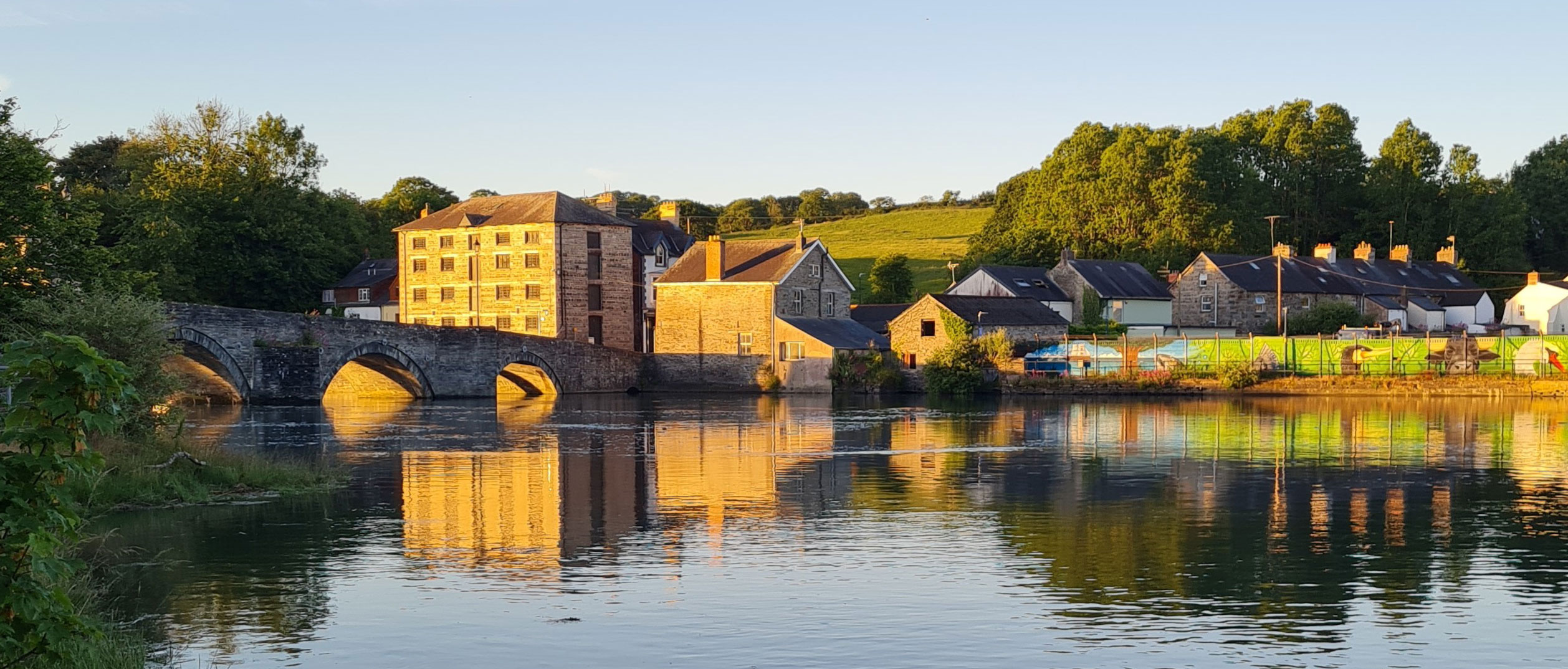A guide for first-time buyers

Welcome
During the combined 27 years we’ve been serving the people of West Wales, we’ve helped hundreds of clients take their first steps onto the property ladder.
Our experience means we know just how exciting, terrifying, inspiring and overwhelming the whole process can be.
Some people are excited about moving out of rented, shared accommodation, or parents’ homes.
Others are anxious about the amount of responsibility, paperwork, and money this move involves.
We are here to guide and support you throughout the ups and downs of your home-buying journey.
Our aim is to ensure you have the right guidance and support to help you make the best decision for you and your future.
After reading this, you may find it beneficial to have a no-obligation, confidential chat with us about your situation.
Thank you for your time, and please get in touch with us if you have any questions
whatsoever.

Tania Dutnell & Helen Worrall
MNAEA Residential and Commercial
Co-owners and Directors
Cardigan Bay Properties
Money talk: mortgages, deposits, and the rest
What is a mortgage?
A mortgage is a big loan, usually from a bank or building society. They assess your viability on a variety of factors based on your financial situation.
You pay it back to the lender on a monthly basis over a long term, like 25 years. You also have to pay interest back on the loan. It’s a big debt to have but is the main way most people are able to buy property.
How much deposit do you need?
There are some lenders who offer a 95% mortgage so you would need a 5% deposit. If you were buying a property for £200,000, you would need a £10,000 deposit for example. You could put down a 10% deposit at £20,000 or 15% at £30,000 etc.
The bigger your deposit, often the better your interest rate and the lower your monthly repayments will be. Also, a bigger deposit can mean you’re more likely to be accepted for a mortgage.
Other costs to consider
- Survey costs
- Legal fees (which would include searches and disbursements)
- Stamp Duty (Land and Buildings Transaction Tax for Scotland and Land Transaction Tax for Wales)
- Insurance – building and contents
- Life insurance – the lender is likely to require this so if anything happens to you, the mortgage debt is settled
- Moving costs
- Renovation costs (if applicable)
- Property maintenance costs from mowing the lawn to replacing roof tiles and cleaning gutters
- Furniture, appliances, and other homeware to put in your new home
- Decorating
- Council tax
- Bills like electricity, water, gas, sewerage etc
**As a buyer in the UK, you don’t pay the estate agent. It’s the seller that does that.**
Financial advisers
Financial advisers come in many guises.
Some mortgage brokers are only able to offer you products from a panel of lenders. This limits your options.
These sorts of brokers can sometimes be found within estate agent offices. Big corporate estate agent chains commonly target their staff to drive you to these in-house mortgage people. They can charge you big fees, too.
Independent mortgage advisers often have access to all the deals in the market at any one time.
They can often be very supportive. Their speciality is obviously mortgages. This means they’re very in tune with the marketplace.
Independent financial advisers may or may not charge you. They can get their fee from the lenders. They generally have excellent relationships within the whole of the financial marketplace. This means they can negotiate the best mortgage for your situation.
They can also support you to get insurance with the best deals and help you with things like your pension. These people can become your money ‘go to’ for many years.
Remember that you can often secure a better deal when you have a big deposit. Saving for your deposit can feel like a big mountain to climb.
There are little things you can do to keep yourself on track.
- Create a vision board with your favourite property and interior styles – somewhere you’ll see it regularly. This can help you stay focused on your goals. You could create a collage from magazines or there are even apps for a digital version.
- Set up an automatic transfer, so that each month an amount of money goes straight into a savings account. It will build up without you even having to think about it.
- Tell your friends and family about your goal. They can encourage you to make good decisions. It’s much more fun to be thrifty with other people, too. You could do things like cook at home together, instead of spending on a takeaway, for example. Little things like this can help you save money so you can add to your savings even faster.
How to find your ideal home
When you first start thinking about buying your new home, you may have a dream in mind. You may have certain things that you cannot compromise on.
Perhaps you need off-road parking so you can easily find a space after work.
Perhaps you need a second bedroom to make into an office.
As you research the available properties, you may discover that your dreams are not realistic within your budget.
This is perfectly normal. It happens regardless of how much money you have to spend, whether this is your first property or fifth.
Remember to be flexible.
Wheretolook
You will have heard of websites like Rightmove or Zoopla. These are great to browse for homes. You can get the gist of what kinds of properties are available in what price brackets. Don’t fall into the trap of thinking every available property is on those sites.
Register with local estate agents. Give them a call to explain your budget, preferred area(s) and requirements. Also, follow their social media, some agents (us included) list new instructions on their own social media channels first before they are advertised on the property portals.
When an estate agent goes to see a property that will soon be available, there is a process they follow before it can go online. Things like completing paperwork, writing adverts, taking photos or videos have to be done. It can take as long as two weeks.
Any decent estate agent will contact the people they know this property would be a great fit for before all those items are ticked off the list. If you are registered with the agent, you could view the property, make an offer and start the buying process, before it’s ever gone online.
Great estate agents hear what your property needs are, even if you’re not able to articulate them. When they suggest you visit a property, it’s with good reason.
Think of the property shows on TV: how many times do they buy the ‘mystery house’? Be guided by the pros. It’s not their first rodeo!
Four tips for viewings
1. Visit the area
If you know roughly where the property is, go for a potter around nearby. Don’t worry too much about the property itself. You’ll get to check that out with the estate agent on the viewing. Get a feel for the vicinity and if it’s the sort of place you could see yourself being happy. See where things are nearby that could be useful, like a shop or public transport.
2. Get prepped
Make a list of things to check and questions to ask on the viewing. You might not have any, which is also fine. If you do have things you want to chat through, it can be helpful to have those prompts with you.
3. Don’t worry
Estate agents are experienced at supporting first-time buyers. Feel free to voice any concerns you may have. There’s no such thing as a silly question. The laws in the UK do a lot to protect you when you’re buying property. The chances of something awful being hidden is pretty slim. Hire a surveyor later in the process to properly check things out. If you see cracks, for example, the chances are they’re from settlement and not structural. Don’t worry and use the experts, it’s what they’re there for.
4. Don’t delay
There’s a saying in estate agency: ‘The house you’re thinking about overnight is the same one someone saw yesterday, thought about overnight and is going to buy today.”
If you like it, make an offer. There’s a real FOMO (fear of missing out) for first-time buyers. This can make you dither and wait ‘in case something better pops up’. There’s only so many places you can buy in your budget that fit your ‘must-haves’. Don’t miss out on The One.
We hope you found the information in this guide useful. Whatever questions you have about buying your first home, please feel free to contact us. We’re here to help in this exciting chapter of your life.
Your Moving Checklist
Below is an 11-point checklist to help you prepare for your move.
Once you are sure you want to move, call your local estate agents and register your wants and needs with them. You’ll find out about properties that suit you this way, maybe even those you thought might be over budget or not quite right in another way.
Speak to an independent financial adviser about your mortgage and insurance options.
Instruct a recommended conveyancing solicitor to handle the legalities of your sale.
Get ahead with packing. Even though you may not have a move date yet, it’s always worthwhile boxing up those items you don’t use much. This will make your life a little more comfortable in the future.
Use this opportunity to only move items that you really want or need. It will save you some money in moving costs and you could make a bob or two selling certain items. Charity shops, home clearance, and auction houses can be useful. There are also online options, like Facebook Marketplace or Freecycle.
When you’ve had an offer accepted and agreed on a completion date, get three quotes from different removal companies. Look for ones that come recommended and which are fully insured.
Don’t plan your new interior to the finest detail. You may have some broad ideas but it’s best not to spend too much time or money on new paint, furniture or accessories until you’ve lived there a little while. For big jobs, it’s recommended to wait around 12 months so you’ve experienced all seasons in your new home before starting a project.
Remember to speak to your bank, utility companies and insurance providers to arrange
set up and change of address.
Start getting quotes for insurance on your new property starting from the date you are
set to complete the move.
The day before the move, create an essentials box with any items you might need quickly when you move in. For example, kettles, cups, and tea and coffee always come in handy.
On the day of the move, take any essential items or documents with you, such as
medicines, passports, wallet/purse, keys, and glasses.
If you have any questions about anything in this guide remember we
are here to help, so please feel free to contact us at
info@cardiganbayproperties.co.uk or call us on 01239 562 500